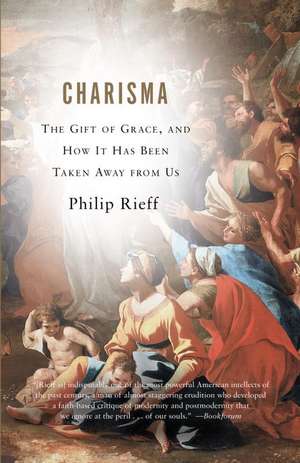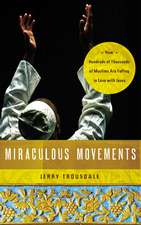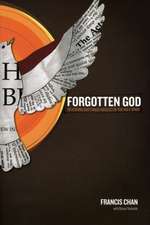Charisma: The Gift of Grace, and How It Has Been Taken Away from Us
Autor Philip Rieffen Limba Engleză Paperback – 29 feb 2008
Preț: 106.04 lei
Nou
Puncte Express: 159
Preț estimativ în valută:
20.29€ • 21.24$ • 16.79£
20.29€ • 21.24$ • 16.79£
Carte disponibilă
Livrare economică 17-31 martie
Preluare comenzi: 021 569.72.76
Specificații
ISBN-13: 9780307277534
ISBN-10: 0307277534
Pagini: 269
Dimensiuni: 142 x 202 x 16 mm
Greutate: 0.22 kg
Editura: Vintage Books USA
ISBN-10: 0307277534
Pagini: 269
Dimensiuni: 142 x 202 x 16 mm
Greutate: 0.22 kg
Editura: Vintage Books USA
Notă biografică
Philip Rieff, Benjamin Franklin Professor of Sociology and University Professor Emeritus at the University of Pennsylvania, is author of the classic works Freud: The Mind of the Moralist, The Triumph of the Therapeutic, and Fellow Teachers and the editor of The Collected Papers of Sigmund Freud. Rieff died in July 2006.
Extras
Chapter One: Spray-on Charisma
It all seems perfectly plausible; in fact, the item advertised on p. 2 of this book may be on the market now, having seen it prophesied in the New Yorker cartoon.
Is it not likely that since all action is now decided from the outside in that a spray-on charisma can will soon be invented? We shall have the recognition factors sorted out, and so by purchase smartly in the economy size, spray ourselves into something extraordinary. This is simply to say what Søren Kierkegaard said more than a century ago, that all inwardness is lost. In this book, I have tried to work through, critically, toward an understanding of how my inwardness was lost for me, and to recognize those chiefly responsible for the loss—our charismatics. The writing has not been therapeutic; on the contrary, that is the point. From the extraordinary way in which Max Weber, among others, canned charisma for us, I have learned that I am opposed to all therapies. The therapeutic is that terrible beast who has been slouching toward Bethlehem. The pity of our lives is that there are no charismatics to save us from him. We can hope for the spray-on charisma can, which will realize the ancient dream of making even the least of us extraordinarily attractive on the outside. The world is fuller than ever before of people who look like charismatics and try to act the part; like the early medieval sect of Waldenses, they insist on wearing sandals, some even in winter. If not to be like the founder, which was the original reason for wearing sandals, then to be recognizable, a little extraordinary, in lieu of the spray-on charisma can. I doubt that the Western world has ever been so full of innovators all hawking their changes, or so full of deviants, all asserting their rights. Where are the charismatics? The question is, more precisely, who are the charismatics? Who deviates decisively from the beaten path? Who opens a new road, a different way of life and revelation for men to go, even remain, for such openers of new roads are all but lost. Is he a guru, like Timothy Leary, for the guru, in its original meaning, meant, I understand, heavy, weighty, venerable. A modern guru, a figure like Timothy Leary or Norman O. Brown, carries the reverse meaning. He is deliberately weightless and preaches weightlessness to us. The modern guru represents the ephemeral, the fugitive, the contingent. It is in this sense that he is an exemplar, someone to follow.
Where are our gifted leaders, our charismatics? Perhaps the idea itself is an illusion and not only has no future, but has no past. My position in this book will be that there is no charisma without creed—there must be a conscious and intense established symbolic* in the field before there can be a standard that can be used to break through that field. Doubt, skepticism, infidelity, are not charisma, nor are they therapy, the two major terms I shall use throughout this book. Yet charisma proclaims something to be true and important. In Weber’s idea, it announces a way, it lights the fire of a new interdict, it has the emphasis of infallibility, no less than that which it breaks through. But I ask again, where are our charismatics? Certainly, we have stunning numbers of people who copy the outward features of the charismatic. They insist on wearing sandals. But there is a great new perplexity in an anti-credal order such as our own, because being therapeutics now there is no correlation between soul and body. All is body. Nothing material now emanates from the spiritual. We are mirrors still, but not mirrors of some spiritual or inner reality from which our appearance is derived. Rather, our world is as a theater, and in that theater, rather than the world as church, the program announces the end of all sacramental action; wearing sandals itself must be put in quotation marks—it is a role, a put-on, one of the many costumes that may be worn, one of the transformations and adjustments for which the therapeutic more or less consciously can prepare himself.
It is through Weber that charisma promises to be, and has become, a marketable item. But in the course of this book, I shall look at charisma as it has been considered before Weber and after. And the book itself intends to go beyond Weber’s thought and to try to establish what a charismatic may be, if he is to oppose the therapeutic. Therapeutic and charismatic are proposed in this book as ideal anti-types. Thus, for Weber, the charismatic leader proposes a radical breakthrough, a transformation of those transgressive motifs proposed by him in his Protestant pathos as shadowing of a new normative order. The therapeutic, on the other hand, also proposes a radical transformation of transgressive motifs, but not as foreshadowings of a new normative order. Indeed, the key to understanding the therapeutic as the successor ideal anti-type of the charismatic is that he hopes for, as his own lifestyle proclaims, a society in which there is no normative order. It is further my intention to demonstrate how the modern Protestant and Weberian conceptions of the charismatic in fact lead toward this successor type, the therapeutic, and toward a transformation of transgressive motifs in a way that throws no shadow of normative order upon the future. My thesis shall be that the therapeutic is the ideal anti-type and real successor of the charismatic. I understand the charismatic as somehow in truth an innovative resolver of ambivalences by the introduction of new interdicts into our lives. The fire of a new no. The therapeutic is a releaser from the interdicts, a transgressive figure. The two are thus very closely related and it is their relation that is the chief concern of this book, and not an analysis of Weber, Marx, Freud, or any particular figure. They are pegs around which at times, given my lack of greater skills, I have hung my analysis. But they are important pegs, and they themselves have helped make the transition between the dominance of the charismatic ideal and the therapeutic anti-ideal.
In this period of transition, our would-be charismatics are better understood as terrorists. The relation between the transitional, modern notion of charisma canned in the sense Weber, as I shall show, canned it, and terror needs some preliminary explanation. Perhaps the best place to begin is with the suggestion that holiness is entirely interdictory. A moral absolute thus becomes the object of all. Holy terror is charismatic; our terror is unholy. For our charismatics are engaged in no wrestlings of angels, but, rather, with the obeying of demons. Jacob was a charismatic when Laban and Jacob took mutual pledges before the God of their fathers; Jacob swears by the fear of his father, Isaac (Genesis 31:53). What is this charismatic fear? What is holy terror? Is it a fear of a mere father; in a phantasmagoric enlargement, Freud’s idea is silly. Holy terror is rather fear of oneself, fear of the evil in oneself and in the world. It is also fear of punishment. Without this necessary fear, charisma is not possible. To live without this high fear is to be a terror oneself, a monster. And yet to be monstrous has become our ambition, for it is our ambition to live without fear. All holy terror is gone. The interdicts have no power. This is the real death of God and of our own humanity. It is out of sheer terror that charisma develops. We live in terror but never in holy terror. Those are the only alternatives, as I shall try to show in the course of this book.
A great charismatic does not save us from holy terror, but rather conveys it. One of my intentions is to make us again more responsive to the possibility of holy terror.
To lead into an understanding of the difference between the terror in our lives and holy terror, the difference between charisma and therapy, the two alternatives we have before us, the most convenient object is the thought of Max Weber on charisma. That will lead us also, by the way, into the deepest tension of modern sociology as a discipline functioning to dissolve all inwardness. We turn, therefore, first to an analysis of Max Weber’s thought on charisma. Weber’s sociology of charisma embodies at its greatest the polemical thrust of sociology, its intellectualism, its high function in the process of rationalization, that dissolution into meaninglessness from which such a discipline as sociology cannot save us. This intellectualism is coupled with a deliberate detachment from responsibility that goes under the name of science. Of course, such an intellectualism can be a conservative force, as Weber noted in the case of the priestly rationalizers of written sacred traditions. Or, it can be conservative through its defense of the high social status and institutional responsibility of the professional rationalizers themselves, the sociologists. But, even so, the interdicts are generally reduced by reason to magic, and the attack of sociology, like the attack of its Protestant predecessor, is on the very animus of charisma, as magic. Weber’s entire treatment of religion is utterly suspect, and I shall try to unfold the suspicions. Weber is himself the culminating expression, I think, of the Protestant pathos, which turns into evolutionism and progressivism, with its mystique of breaks with the established order as the highest expression of the intellect and of soul. This Protestant pathos, this mystique of breaks with the established order, is less than a revolution and more than a reform. It is that relentless lusting after progressive social change that characterizes the liberal era and leads straight into the Marxist pathos, with its generalized species man, who turns into an apparatchik and party functionary. The truest reason for beginning with Weber is that in particular through his reworking of the idea of charisma, Weber made the most genuinely honest soundings, as Karl Jaspers said in his memorial address of the human spirit in the contemporary world. Weber achieved a form of such genuineness that his work became the adequate expression of truly original thought and fulfilled humanity. These soundings of the human spirit in the contemporary world need not remain unchallenged and opposed, and in this manuscript I have dared not only to learn from them, but to challenge and oppose them.
*A symbolic is a particular order of interdicts and remissions.
From the Hardcover edition.
It all seems perfectly plausible; in fact, the item advertised on p. 2 of this book may be on the market now, having seen it prophesied in the New Yorker cartoon.
Is it not likely that since all action is now decided from the outside in that a spray-on charisma can will soon be invented? We shall have the recognition factors sorted out, and so by purchase smartly in the economy size, spray ourselves into something extraordinary. This is simply to say what Søren Kierkegaard said more than a century ago, that all inwardness is lost. In this book, I have tried to work through, critically, toward an understanding of how my inwardness was lost for me, and to recognize those chiefly responsible for the loss—our charismatics. The writing has not been therapeutic; on the contrary, that is the point. From the extraordinary way in which Max Weber, among others, canned charisma for us, I have learned that I am opposed to all therapies. The therapeutic is that terrible beast who has been slouching toward Bethlehem. The pity of our lives is that there are no charismatics to save us from him. We can hope for the spray-on charisma can, which will realize the ancient dream of making even the least of us extraordinarily attractive on the outside. The world is fuller than ever before of people who look like charismatics and try to act the part; like the early medieval sect of Waldenses, they insist on wearing sandals, some even in winter. If not to be like the founder, which was the original reason for wearing sandals, then to be recognizable, a little extraordinary, in lieu of the spray-on charisma can. I doubt that the Western world has ever been so full of innovators all hawking their changes, or so full of deviants, all asserting their rights. Where are the charismatics? The question is, more precisely, who are the charismatics? Who deviates decisively from the beaten path? Who opens a new road, a different way of life and revelation for men to go, even remain, for such openers of new roads are all but lost. Is he a guru, like Timothy Leary, for the guru, in its original meaning, meant, I understand, heavy, weighty, venerable. A modern guru, a figure like Timothy Leary or Norman O. Brown, carries the reverse meaning. He is deliberately weightless and preaches weightlessness to us. The modern guru represents the ephemeral, the fugitive, the contingent. It is in this sense that he is an exemplar, someone to follow.
Where are our gifted leaders, our charismatics? Perhaps the idea itself is an illusion and not only has no future, but has no past. My position in this book will be that there is no charisma without creed—there must be a conscious and intense established symbolic* in the field before there can be a standard that can be used to break through that field. Doubt, skepticism, infidelity, are not charisma, nor are they therapy, the two major terms I shall use throughout this book. Yet charisma proclaims something to be true and important. In Weber’s idea, it announces a way, it lights the fire of a new interdict, it has the emphasis of infallibility, no less than that which it breaks through. But I ask again, where are our charismatics? Certainly, we have stunning numbers of people who copy the outward features of the charismatic. They insist on wearing sandals. But there is a great new perplexity in an anti-credal order such as our own, because being therapeutics now there is no correlation between soul and body. All is body. Nothing material now emanates from the spiritual. We are mirrors still, but not mirrors of some spiritual or inner reality from which our appearance is derived. Rather, our world is as a theater, and in that theater, rather than the world as church, the program announces the end of all sacramental action; wearing sandals itself must be put in quotation marks—it is a role, a put-on, one of the many costumes that may be worn, one of the transformations and adjustments for which the therapeutic more or less consciously can prepare himself.
It is through Weber that charisma promises to be, and has become, a marketable item. But in the course of this book, I shall look at charisma as it has been considered before Weber and after. And the book itself intends to go beyond Weber’s thought and to try to establish what a charismatic may be, if he is to oppose the therapeutic. Therapeutic and charismatic are proposed in this book as ideal anti-types. Thus, for Weber, the charismatic leader proposes a radical breakthrough, a transformation of those transgressive motifs proposed by him in his Protestant pathos as shadowing of a new normative order. The therapeutic, on the other hand, also proposes a radical transformation of transgressive motifs, but not as foreshadowings of a new normative order. Indeed, the key to understanding the therapeutic as the successor ideal anti-type of the charismatic is that he hopes for, as his own lifestyle proclaims, a society in which there is no normative order. It is further my intention to demonstrate how the modern Protestant and Weberian conceptions of the charismatic in fact lead toward this successor type, the therapeutic, and toward a transformation of transgressive motifs in a way that throws no shadow of normative order upon the future. My thesis shall be that the therapeutic is the ideal anti-type and real successor of the charismatic. I understand the charismatic as somehow in truth an innovative resolver of ambivalences by the introduction of new interdicts into our lives. The fire of a new no. The therapeutic is a releaser from the interdicts, a transgressive figure. The two are thus very closely related and it is their relation that is the chief concern of this book, and not an analysis of Weber, Marx, Freud, or any particular figure. They are pegs around which at times, given my lack of greater skills, I have hung my analysis. But they are important pegs, and they themselves have helped make the transition between the dominance of the charismatic ideal and the therapeutic anti-ideal.
In this period of transition, our would-be charismatics are better understood as terrorists. The relation between the transitional, modern notion of charisma canned in the sense Weber, as I shall show, canned it, and terror needs some preliminary explanation. Perhaps the best place to begin is with the suggestion that holiness is entirely interdictory. A moral absolute thus becomes the object of all. Holy terror is charismatic; our terror is unholy. For our charismatics are engaged in no wrestlings of angels, but, rather, with the obeying of demons. Jacob was a charismatic when Laban and Jacob took mutual pledges before the God of their fathers; Jacob swears by the fear of his father, Isaac (Genesis 31:53). What is this charismatic fear? What is holy terror? Is it a fear of a mere father; in a phantasmagoric enlargement, Freud’s idea is silly. Holy terror is rather fear of oneself, fear of the evil in oneself and in the world. It is also fear of punishment. Without this necessary fear, charisma is not possible. To live without this high fear is to be a terror oneself, a monster. And yet to be monstrous has become our ambition, for it is our ambition to live without fear. All holy terror is gone. The interdicts have no power. This is the real death of God and of our own humanity. It is out of sheer terror that charisma develops. We live in terror but never in holy terror. Those are the only alternatives, as I shall try to show in the course of this book.
A great charismatic does not save us from holy terror, but rather conveys it. One of my intentions is to make us again more responsive to the possibility of holy terror.
To lead into an understanding of the difference between the terror in our lives and holy terror, the difference between charisma and therapy, the two alternatives we have before us, the most convenient object is the thought of Max Weber on charisma. That will lead us also, by the way, into the deepest tension of modern sociology as a discipline functioning to dissolve all inwardness. We turn, therefore, first to an analysis of Max Weber’s thought on charisma. Weber’s sociology of charisma embodies at its greatest the polemical thrust of sociology, its intellectualism, its high function in the process of rationalization, that dissolution into meaninglessness from which such a discipline as sociology cannot save us. This intellectualism is coupled with a deliberate detachment from responsibility that goes under the name of science. Of course, such an intellectualism can be a conservative force, as Weber noted in the case of the priestly rationalizers of written sacred traditions. Or, it can be conservative through its defense of the high social status and institutional responsibility of the professional rationalizers themselves, the sociologists. But, even so, the interdicts are generally reduced by reason to magic, and the attack of sociology, like the attack of its Protestant predecessor, is on the very animus of charisma, as magic. Weber’s entire treatment of religion is utterly suspect, and I shall try to unfold the suspicions. Weber is himself the culminating expression, I think, of the Protestant pathos, which turns into evolutionism and progressivism, with its mystique of breaks with the established order as the highest expression of the intellect and of soul. This Protestant pathos, this mystique of breaks with the established order, is less than a revolution and more than a reform. It is that relentless lusting after progressive social change that characterizes the liberal era and leads straight into the Marxist pathos, with its generalized species man, who turns into an apparatchik and party functionary. The truest reason for beginning with Weber is that in particular through his reworking of the idea of charisma, Weber made the most genuinely honest soundings, as Karl Jaspers said in his memorial address of the human spirit in the contemporary world. Weber achieved a form of such genuineness that his work became the adequate expression of truly original thought and fulfilled humanity. These soundings of the human spirit in the contemporary world need not remain unchallenged and opposed, and in this manuscript I have dared not only to learn from them, but to challenge and oppose them.
*A symbolic is a particular order of interdicts and remissions.
From the Hardcover edition.
Recenzii
“[Rieff is] indisputably one of the most powerful American intellects of the past century, a man of almost staggering erudtion who developed a faith-based critique of modernity and postmodernity that we ignore at the peril . . . of our souls.” —BookForum “A compelling diagnosis of our condition.” —The Wall Street Journal“Magnificent. . . . Few intellectuals of recent decades have a better track record of identifying blind spots in the higher common sense.” —The New York Times Book Review“Subtle and convincing.” —The New York Sun












